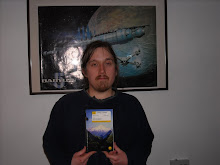I've recently read The Writer's Journey by Christopher Vogler. I say recently but it was actually last year!
I read this book for university. Its one of three books that I'm using for a scriptwriting essay. It is a book to help writers in the creation of their stories. There are two main sections to the book, Character Archetypes and Stages of the Hero's Journey.
Character Archetypes describes well known character types that we all would recognise. To give one example we have the archetype of the mentor. Obi-wan Kenobi, in the original Star Wars, is the quintessential mentor. He is the person who guides the hero on their adventure. The other archetypes are ones we would all easily recognise from out own favourite works of fiction. However these are not set in stone. Different mentors will have different mentalities and approach their mentioning in different ways. This is the most important thing to understand when reading this book. Vogler is giving us the building blocks. If the archetypes were followed to the letter it would result in a very boring and unimaginative film.
The hero's journey is also something most of us would recognise. The hero is introduced in their normal life, called the ordinary world, and at some point they embark on an adventure into a new and different world. To use Star Wars again this happens to Luke when he leaves with Obi-wan. Another stage on the journey is the refusal. If you know Star Wars you will know that Luke is at first hesitant to follow Obi-wan. However when his uncle and aunt are killed that refusal disappears and he sets off on an adventure. It is again emphasised here that this is not a direct formula for screen, or any other, type of writing. It is a guideline only. For instance Vogler places the refusal at the beginning of the story but this may come later or not at all. It The Princess Bride Westly is completely unwavering in his pursue of Buttercup and only has a refusal near the end of the film.
I recommend this book to any aspiring writer. The book skilfully shows how to build up a story and uses popular culture references so it is easy to see in a practical way. It also shows that this is not an exact formula and can be rearranged. This is something that I think films desperately need. I've seen so many films that follow the precise structure. The one where two people fall in love and it all seems so perfect and then one of them puts their foot in it. They say something stupid and it seems the couple won't get back together. It even happens in Shrek - when hallelujah plays. That's not to say this formula can't work, Shrek is brilliant, but I think it is over used.
Wednesday 8 February 2012
Subscribe to:
Posts (Atom)

